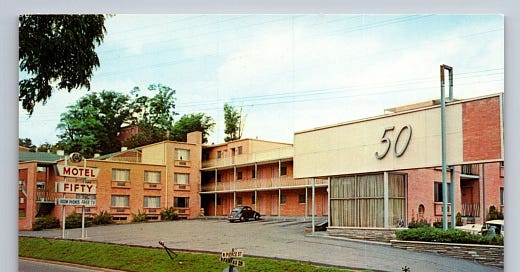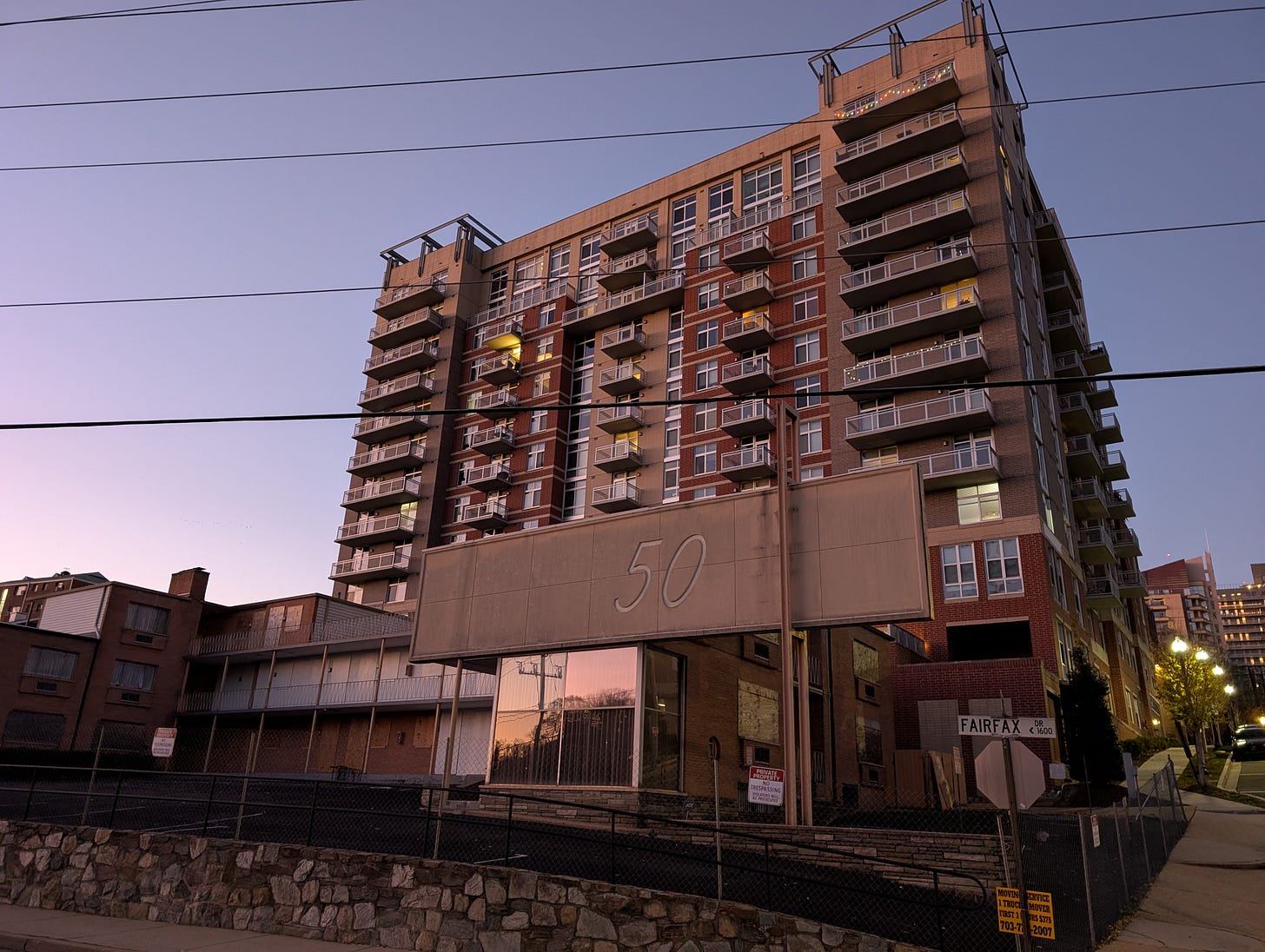Moton, Motel 50, and More JBG Smith
The Green family once operated a pair of budget motor lodges in Arlington County. Now both are facing demolition.
I first became acquainted with the Inn of Rosslyn in 2018, when I used to rent a parking space in the lot adjoining The Weldon on N. Rolfe St. I lived in Crystal City at the time, so I whenever I needed my car, I’d take the blue line to Rosslyn, then walk the twenty-or-so minutes from the station to my parking space, passing the Inn along the way. I never gave it much thought, except that I thought it looked strange, an old roadside motel surrounded by modern high-rise apartments. It reminded me of Virginia Lee Burton’s The Little House, in which a quaint, country house finds itself surrounded by skyscrapers and smog-choked skies.

Six years later, and I’m jogging at night along Arlington Boulevard Trail, across from Joint Base Myer-Henderson Hall, and I pass an Inn of Rosslyn surrounded by chain link fence. It looked even sadder now, and I knew right then it would make the perfect subject for a future Substack.
1601 and J.T. Moton
The Inn of Rosslyn sits at 1601 Fairfax Drive, though sometimes its address is listed as 1601 N. Fairfax, as in the case of its property card, or 1601 Arlington Blvd. Arlington Boulevard of course parallels Fairfax Drive, so it is easy to see how one could make this mistake. Regardless, the earliest recorded owner of 1601 was a John T. Moton. Moton, of 2309 Mt. Vernon Avenue in Alexandria, was one of the principal owners of J.T. Moton Realty, and a somewhat unsavory character. Though his story diverges somewhat from that of the Inn, it is worth mentioning in detail here.

According to Barry Mackintosh’s Assateague Island National Seashore: An Administrative History, in 1957, Atlantic Ocean Estates, Inc., a Moton company, purchased a large tract of land on the northern end of the island from the Delaware Mortgage Company and subdivided the land into 1,740 individual lots.1 Moton immediately began offering these lots up for sale, but there was a catch. There was no way for these new landowners to access their island lots. Not only could they not reach the lots without crossing private property, no roads existed to reach the lots in the first place.2 Furthermore, as Mackintosh notes, “the rapid westward migration of that end of the island—frequently overwashed by the ocean—resulted in the permanent inundation of many tracts, which quite literally became ‘Atlantic Ocean Estates.’”
In 1962, Moton was sentenced to 181 days in jail and ordered to pay $1,000 after he was found guilty of mail fraud for “falsely advertising that Wall Street [Savings and Loan Association] handled mortgages insured by the Federal Housing Authority.” Moton was one-time president of the firm.

In 1970, Moton was in the news again after securing a $10,000 bond for H. Rap Brown, the civil rights activist and later Muslim cleric on trial for arson, through another Moton venture, the Eastern Shore Bail Bond Service.3 According to an article by Bob Woodward, then a reporter with the Montgomery Sentinel, Eastern Shore was not licensed by the state. Nevertheless, Moton put up his 1970 Cadillac and a motel “mortgaged ‘to the hilt’” as collateral for the bond. However, when Brown skipped town, the money was not collected. The reason, Howard County prosecuting attorney Richard J. Kinlein suspected, was because Moton and William B. Yates, prosecuting attorney for Dorchester County, where the trial was held, “[were] in cahoots.” When the trial was moved to Howard County, Kinlein ordered the Cadillac and the motel, the Oceanic Motel, seized.4 Incidentally, the Oceanic Motel leads me to the last Moton venture, “Marine-Land.”
In 1965, Moton opened the doors to this aquatic attraction, right next door to his motel. Its attractions included sea lions, porpoises, sea turtles, and crocodiles. However, as Hunter “Bunk” Mann, author of Vanishing Ocean City, writes:
“Unfortunately, the history of Marine-Land was filled with numerous animal escapes as its legacy. In August 1965 the sea lions broke out of their pens and some were never found. Others ended up in New York and Norfolk while one spent the rest of the summer in a lagoon in West Ocean City. Once the porpoises swam out of their pens in the middle of a storm, while on another occasion an alligator got loose and was found in the marsh behind 56th Street.”
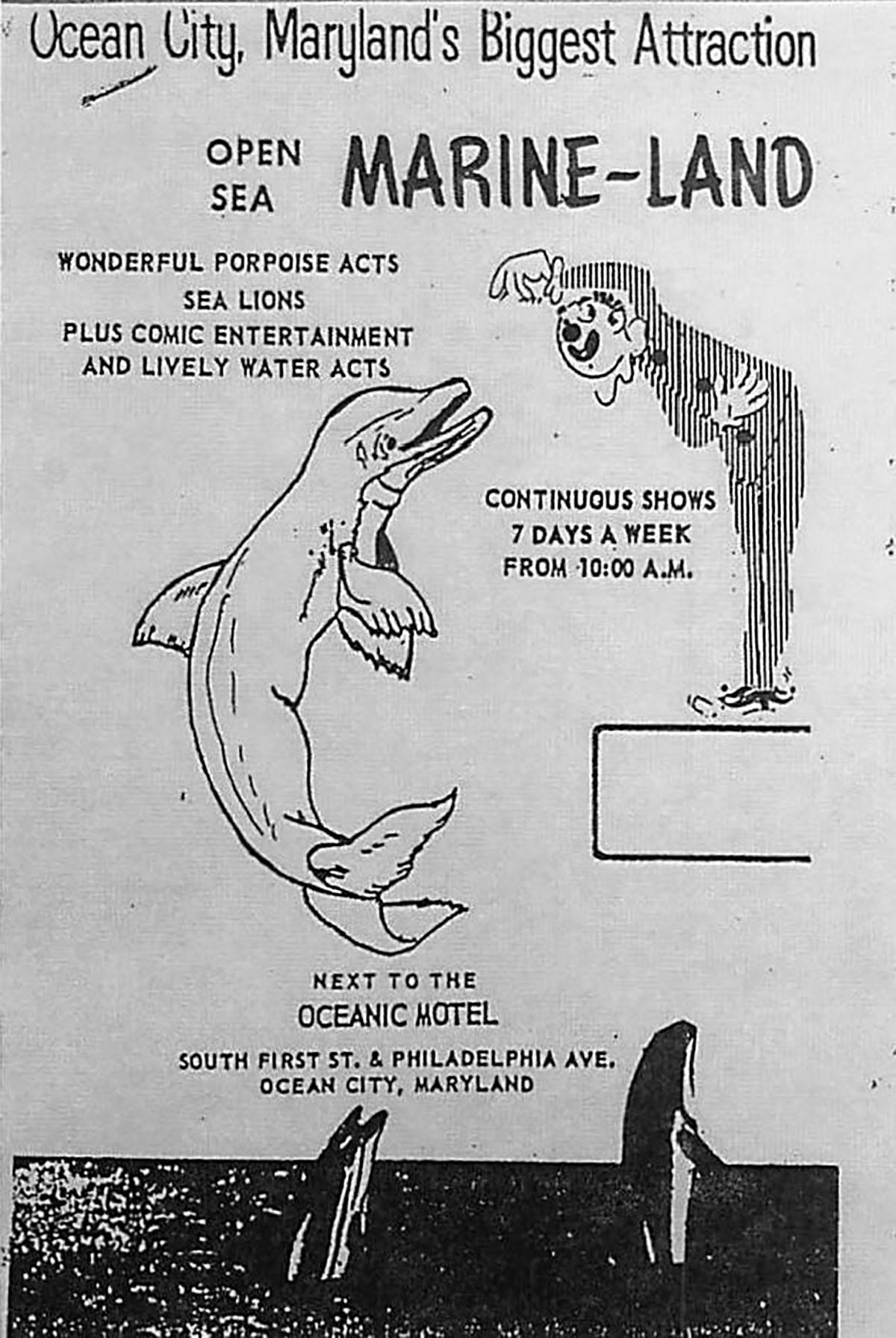
The Greens Take Over
Having covered all of Moton’s ventures and mishaps, we can now return to the main subject of this article. In 1956, William Delaplaine Green and Norma Lake Green acquired 1601 Fairfax from Moton. One year later, construction was completed on Motel 50, the original name for the Inn of Rosslyn.
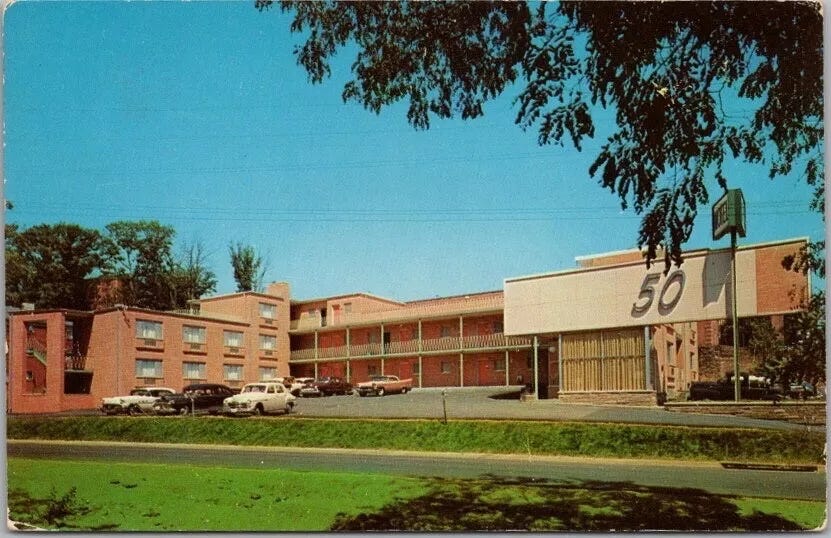
William attended Lehigh University, graduating in 1940 with a bachelor of science in engineering. He initially went to work for General Electric, where he built jet engines during World War II. However, according to his daughter, Katherine, he wanted to give his family “financial independence” and “[h]e didn’t want to work for a big corporation.” According to an obituary for Norma, while her future husband was building jet engines, she was serving in the Women’s Army Corp as a dietician. The two were married on June 16, 1944.

Following completion of Motel 50, the Greens purchased the Williamsburg Apartments in 1958. In 1961, they founded the Americana Corporation, and two years later they opened a second lodge, the Americana Hotel, in Crystal City. As Arlington Magazine wrote, the Americana “might have enjoyed a run as Arlington’s swankiest hotel” if not for “an entrepreneurial couple from Utah”, the Marriotts, who opened the Twin Bridges Motor Hotel at 14th St six years earlier.
On top of managing two motor lodges, an apartment building, and competing with the upstart Marriotts, William Green added an additional responsibility to his plate when he was named as one of three directors of the Commonwealth National Bank of Arlington. The other two were Charles T. Lindsay of Lindsay Oldsmobile-Cadillac Co., and John H. Yingling, a consultant to the Senate Committee on Foreign Relations.
The Greens had seven children—Norma, Elizabeth, Carole, Katherine, William Jr., Richard, and John. John managed both the Motel 50 and the Williamsburg Apartments, where he lived, for his father. However, in July 1984, John was shot and killed following a “traffic dispute.” In what was known as the “green Volvo case”, Ricky Nesbitt fired at John six times in what he claimed was self defense after John allegedly rammed Ricky’s Volvo twice with his pickup truck on the 14th St Bridge. A jury returned a guilty verdict and recommended Nesbitt serve a life sentence.
William Jr. attended Lehigh University like his father and worked for "the family business” after graduation. However, his true passions were inventing and poetry. His inventions led to several patents with the U.S. Patent Office, including a flat plane laser light and a two cycle internal combustion engine; and a few of his poems are kept at the Library of Congress.

In 1995, Katherine took over as caretaker of the Green properties through Amitel Incorporated, a Florida-based corporation. The Greens had since acquired another property, the Fern Gardens Apartments, bringing their total portfolio to four properties. As of December 2024, Richard was the president of Amitel. Katherine left the company to pursue politics, running for state representative in Oregon’s 5th District. However, she lost to Pam Marsh in the November 2024 election.
Notable Residents
Motel 50 was available for renting and leasing, and it saw its share of interesting clients for both. For example, in 1979, Room #301 was occupied by Ali Seyed Farchtchi, Second Secretary of the Embassy of the Islamic Republic of Iran. Farchtchi, who passed away in 2018, was remembered as a “complete gentleman [with] a very dignified bearing” and “depth of insights into many major foreign and domestic affairs.” Another diplomatic figure, Chief Warrant Officer Maximo Pisconte, an administrative assistant in the Peruvian Air Attache office, was a resident of Motel 50 in 1982.
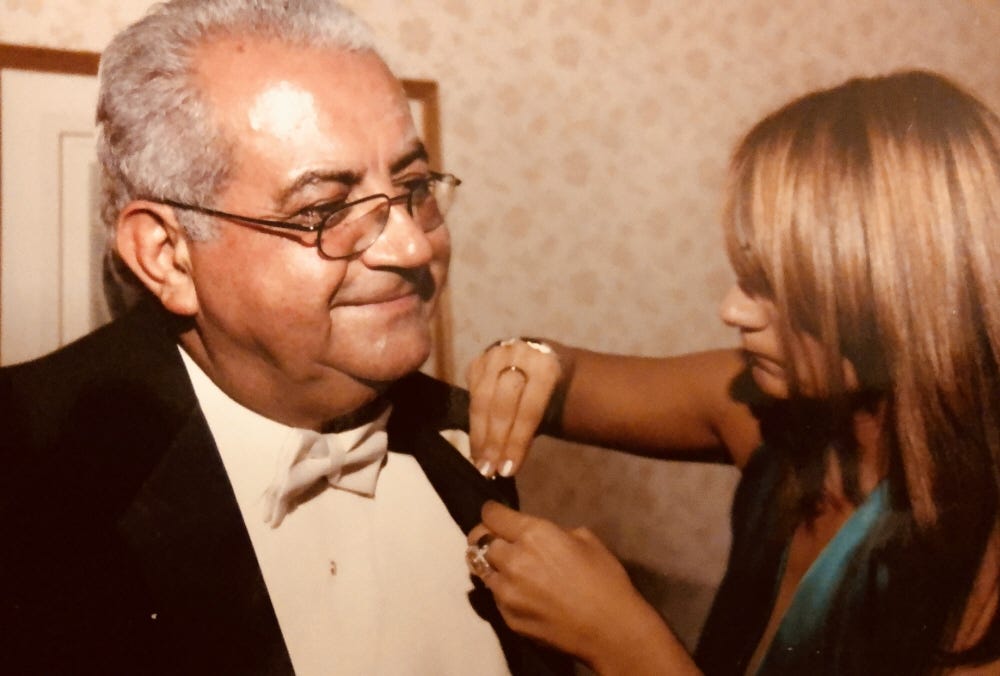
Denzel C. “Denny” Carrico was also a one-time resident of Motel 50, occupying Room #101 in 1963. Carrico was a member of the American Numismatic Association and fought with the 87th Mountain Infantry during World War II.5 Carrico was wounded fighting the Germans on Mount Mosca in Italy in 1945. He passed away in 1976.

JBG Smith and the End of Motel 50
In late 2020, the Green family sold both Motel 50, which had since become the Inn of Rosslyn, and the Americana to developer JBG Smith. They also sold both apartment buildings. According to Katherine Green, who spoke to ARLNow, the family was “hemorrhaging money” because of COVID-19. While Katherine noted that her father was fortunate enough to build a business in a region where property is valued so highly—the Inn was assessed at approximately $5 million—she added that:
“It’s hard for the employees. Some have worked for us for 20-odd years. Many were housed in family property and we don’t know if they’ll find jobs.”
On her campaign website, she was more candid about the end of Motel 50 and the Americana:
“This Hotel, built by my father - William D. Green - was functionally bankrupted by the Government’s Covid Policies. My family chose to sell our portfolio in Arlington, leading to highly destructive and excessive taxation and the loss to the community of our services. The interface between government policies, private businesses, & multinational corporations - all too frequently - has created a lack of economic opportunity for small and medium sized businesses while allowing large corporations and huge bureaucracies to act and operate in an unchecked fashion. This current situation is a foundational area of interest and effort which I believe must be addressed successfully for our business communities to thrive.”
According to Paycheck Protection Program records, Amitel Incorporated received a $293,600 loan from Bank of America, all of which was forgiven by the government.
In 2022, JBG Smith sold the Inn to Monument Realty—a sale not yet reflected in Arlington’s online property portal—which plans to demolish the site while preserving “[i]conic features” of the Inn in a forthcoming apartment building. These features include “[m]id-century motifs on the balconies and a ‘50’ sign out front.”

In what should be a familiar pattern to readers of this Substack, commenters on ARLNow are not happy about homage being paid to the soon-to-be-demolished motel, especially when it delays construction of the apartment building:
When one ponders WHY housing is SO expensive in Arlington, one only needs to read this 'quagmire' of an article. The red tape is astounding. The Inn of Rosslyn is HARDLY 'historic'.....Gimme a break
Is Arlington so lacking in character that a new development has to pay homage to the 66 year old flophouse it is replacing?
Arlington is an architectural wasteland. Trying to pretend that this old tired motel has any significance doesn't change that fact. Suggesting that any new building should include any style is ludicrous because there is only one style in Arlington - whatever makes the most money for the developer. It's been that way ever since I moved here in 1988.
While this author cannot comment one way or the other on whether the motel or its character are worth preserving—I moved here in 2018—I am always sad to see an older building go. I was sad when the RCA Building was torn down, when the Highlander Motel was torn down, and I dread the day the Key Bridge Marriott, my favorite building in Arlington, is torn down. I’m afraid I just have a fair bit of the nostalgic in me.
Mackintosh is a historian for the National Park Service. See Barry Mackintosh.
The “private property” in this instance belonged to Thomas B. McCabe, chairman of the Scott Paper Company and a wealthy Republican donor. On August 4, 1972, President Nixon paid a visit to McCabe at the latter’s beach house. See “For Public Outdoor Recreation Use and Enjoyment.”
Brown was initially only charged with “inciting to riot,” a misdemeanor in Maryland. However, in the event Brown skipped bail, Yates wanted Brown put on the F.B.I.’s Most Wanted List, which the initial charge would not support. So, according to Kinlein, Yates “fabricated” the charge of arson, a felony, to get Brown on the list. See “One Prosecutor Asserts Another ‘Fabricated’ Rap Brown Charge.”
According to an article in The Evening Star, Moton planned to fight the seizure, claiming he was not properly served with Howard County court papers.
Numismatics is the study or collecting of currency.

